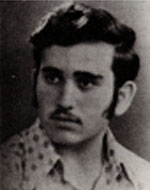Tabak, Moshe-David
Moshe-David, Batya and Shlomo, was born on 14.9.1954 in Moshav Beit Meir in the mountains of Jerusalem. Moshe was educated in kindergarten and elementary school in Moshav Beit Meir, and continued his high school studies at the Kiryat Moshe high school, near the Himmelfarb High School in Jerusalem. As early as his childhood, Moshe-David stood out as a diligent and alert student, and a devoted son with his parents. His educators and teachers tell of his virtues, his gentleness and his gentleness. “It was a sensitive Lev,” said the principal of the elementary school. “This was the last trait, evident in the help that was given to every member at all times, a little heavy, but not very heavy.” Moshe liked to read books, and raised questions when he did not understand anything completely. After completing eight classes, he decided to expand his general education at a yeshiva high school. He was fearful of his youth. His fear of God stemmed from the depths of his Lev, grew, deepened, and developed against the backdrop of his proper measurements and his attitude toward others. His teacher at the Yeshiva High School, Rabbi Weinstock, praised his beloved disciple and noted Moshe’s diligence in studying and fulfilling values in daily life: “A good spirit of spiritual innocence and spiritual honesty would emerge from his ways, both in holiness and in the sand. He would give himself and his soul with all his Lev and soul. ” The rabbi told us how Moshe’s voice was heard during Shabbat prayers. His tone of voice would fill the prayer, out of anxiety and recognition of the holiness of the Sabbath. In the summer of 5732, Moshe completed his studies in the yeshiva, and during the time that remained until his induction into the IDF he assisted his father in the farm. Moshe was drafted into the Israel Defense Forces in late October 1972. After completing basic training, he was assigned to the Armored Corps. He asked to serve in a combat unit but rejected a proposal to serve on a missile ship. He was charmed by the armor, and he told friends and family the satisfaction he received from his service in the Armored Corps. At the recommendation of his commanders, he was sent to another training course, successfully completed it and assigned as a liaison in the southern sector of the Suez Canal front. Moshe was loved by his comrades in the company. One of them says that Moses was a quiet and dedicated man. He added: “Moses was one of those people, who can be sure that they will fulfill every mission perfectly.” The company Moshe served in was supposed to leave the Suez Canal on October 8, 1973. When the Yom Kippur War broke out, Moshe and his comrades were in a stronghold on the banks of the Suez Canal. Moshe was one of the first tank crews, who were called upon to stop the advance of the Egyptians. In the midst of the Yom Kippur War, on October 6, 1973, Moshe’s tank was hit by an anti-tank missile, while his company encountered Egyptian infantry forces. His friends tried to rescue him twice, but they could not reach the burning tank because of enemy fire. Moshe was declared missing and only in Adar 5734 was his body found, in an area that was held by the Egyptians and brought to rest in the military cemetery on Mount Herzl, leaving behind a father, a mother and a brother. His unit commander wrote: “He was a dedicated and loyal soldier, loved by his friends.” His parents donated a Torah scroll to the synagogue in Moshav Beit Meir, and a book about the fallen soldiers included the words of friends and family about Moshe- Uncle.
